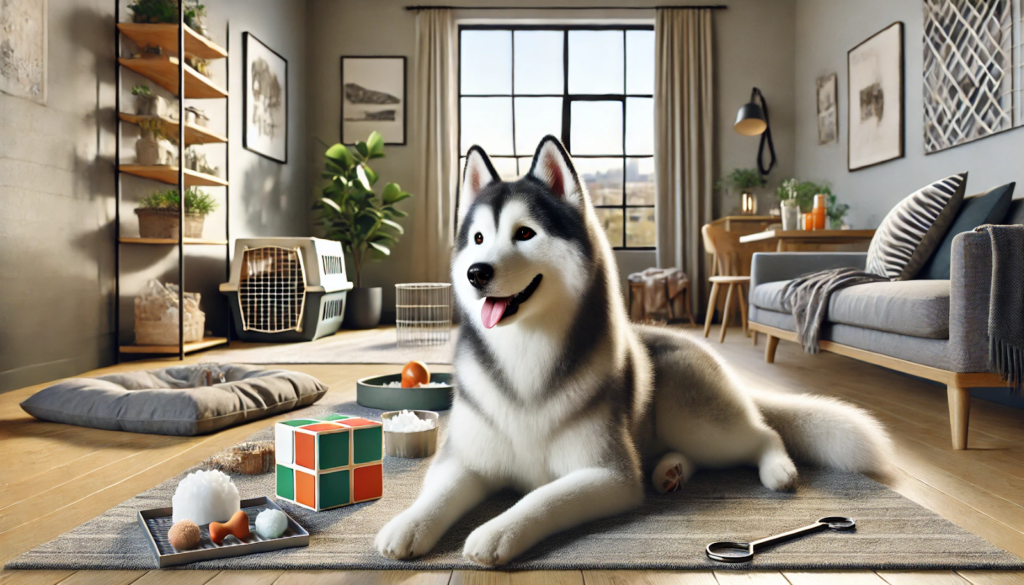Siberian Huskies are famous for their high energy and love of running — which often leads people to believe they need wide-open spaces or country homes. But the reality might surprise you.
Huskies can thrive in apartments, townhouses, and small homes if their physical and mental needs are consistently met.
In this article, you’ll learn:
- How much space a Husky actually needs
- Smart tips for raising a Husky in a compact home
- Creative ways to make up for a lack of backyard space
Do Huskies Need a Big Backyard?
Surprisingly, no. While a fenced yard can be helpful, it’s not essential. What really matters is:
- Daily, structured exercise
- A secure and low-stress environment
- Regular interaction and bonding time
- A predictable, active routine
Plenty of Huskies live happily in urban or smaller settings — provided they get plenty of outdoor time and mental stimulation.
How Much Space Is Really Enough?
| Living Environment | Suitable for a Husky? |
|---|---|
| Apartment | Yes — with consistent walks and enrichment |
| Small house | Absolutely, as long as playtime is routine |
| Large house with yard | Easier, but still requires active engagement |
| Rural property/farm | Great for working Huskies — but secure fencing is a must! |
Here’s the key: Huskies don’t self-exercise. Even in a big yard, if left alone, they may dig, howl, or find destructive ways to burn energy. It’s up to you to keep them engaged.
Tips for Apartment or Urban Husky Living
1. Stick to a Walking Routine
Plan on two walks a day — at least 30 to 45 minutes each. Add in:
- Morning and evening strolls
- Short training sessions in the park
- Weekend adventures or hikes
2. Build an Indoor Activity Zone
No backyard? No problem. Keep your Husky stimulated indoors with:
- Puzzle feeders and snuffle mats
- Frozen KONG toys or homemade treats
- Tug-of-war games
- Training new tricks and commands
Mental challenges can wear them out just as much as physical ones.
3. Practice Good Behavior in Shared Spaces
Use stairwells and elevators as training opportunities. Teach your Husky to:
- Walk calmly on a leash
- Wait patiently at doors
- Avoid barking or lunging in hallways
4. Be a Thoughtful Neighbor
Huskies are vocal. To prevent issues:
- Soundproof rooms if possible
- Avoid long alone times
- Use calming toys and background noise to reduce howling
5. Set Up a Potty Routine
For city living, consistency is key. Create a reliable bathroom schedule:
- Morning and evening walks
- Breaks after meals or naps
- Indoor grass pads for emergencies (especially in high-rises)
Do Huskies Need to Be Off-Leash to Be Happy?
Not at all. While they crave freedom, safety always comes first.
Safe alternatives include:
- Long-line leash walks in open areas
- Fully enclosed dog parks for supervised off-leash play
- Leashed hikes for outdoor adventures
- Supervised zoomies in a fenced yard or large indoor space
Huskies are notorious escape artists and have unreliable recall. Letting one off-leash in an open area is risky unless you’ve trained them thoroughly (and even then, caution is wise).
Ideal Husky Setup — No Matter the Size of Your Home
Here’s how to set your home up for success:
- Non-slip rugs or mats for indoor zoomies
- A quiet corner or crate for rest and decompression
- Interactive toy station for self-directed play
- Clear boundaries — use baby gates or closed doors to block access to unsafe areas like the trash or pantry
Final Thoughts: Huskies Thrive on Routine, Not Square Footage
You don’t need a big backyard to raise a happy, healthy Husky. What you do need is:
- A consistent, active routine
- Mental and physical stimulation every day
- Time, patience, and love
With those things in place, your Husky will flourish — whether you’re in a studio apartment or a suburban home.
It’s not about the size of the space. It’s about how you use it.






